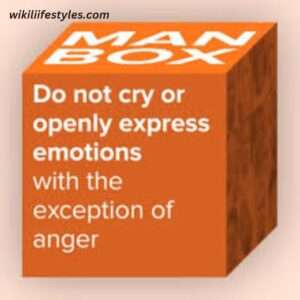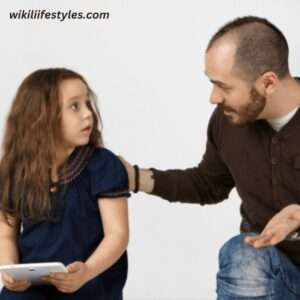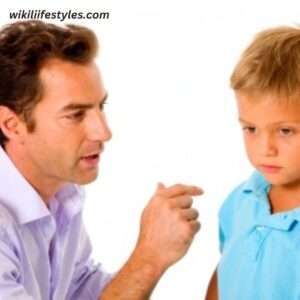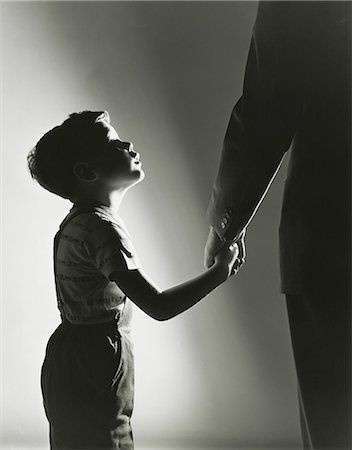A good father is one of the most unsung, unpraised, unnoticed, and yet one of the most valuable assets in our society – Billy Graham
Introduction: Father Influence on Child Emotional Wellbeing
Welcome to Wikilifestyles.com, where we explore the intricate dynamics between fatherhood and a child’s emotional wellbeing. In this journey, we will delve deep into the profound impact fathers have on their children’s emotional lives, addressing various aspects from unresolved emotional wounds to the challenges of vindictive parenting.
Unveiling the Impact of Unresolved Emotional Wounds: How a Father’s Trauma Shapes a Child’s Life
Growing up with a father who is not loving or supportive can leave lasting scars on a child’s emotional landscape. The unresolved emotional wounds inflicted by the father’s trauma may manifest as discomfort in expressing emotions. This sets the stage for a child’s struggle to navigate the complexities of their own emotional wellbeing. Positive parenting, characterized by understanding and emotional support, is the key to mitigating the impact of such wounds and fostering child mental wellness.

The Consequences of Attempting to ‘Mold’ or ‘Shape’ a Child: Defensiveness About Mistakes
When a father attempts to ‘mold’ or ‘shape’ a child according to his expectations, it often results in the child becoming overly defensive about mistakes. The desire to meet parental expectations can create an environment of fear and defensiveness.

Understanding the impact of fatherhood on child development is crucial for fostering emotional growth. Positive parenting involves allowing children the freedom to express themselves while providing guidance and support.
Navigating the ‘Man Box’ Mentality: Desire for Strength, Fear of Weakness
The societal ‘Man Box’ mentality, urging a child to ‘man up,’ can lead to a conflicted emotional state. The child may develop a desire to be seen as ‘strong’ and a fear of being perceived as ‘weak.’ Paternal influence in emotional nurturing becomes essential in breaking free from stereotypical expectations.

In the confining space known as the Man Box, societal expectations dictate that men must embody traits such as strength, success, power, dominance, fearlessness, control, and emotional restraint. However, this rigid definition of masculinity not only limits men but also shapes harmful perspectives on women. Within the Man Box, women are objectified, seen as mere property, and assigned less value than their male counterparts.
The Struggle for Approval: Unconscious Yearning for Father’s Approval Throughout Life
A lack of approval from a father can imprint a deep-seated yearning for acceptance throughout a child’s life. The journey of seeking approval becomes an unconscious part of the child’s emotional landscape. Emotional support and fatherly care are instrumental in providing the validation and approval necessary for a child’s emotional wellbeing.
Conditional Love and People Pleasing: The Impact of Love Tied to Achievements
If a father only shows love when a child accomplishes something, it can shape the child into a people pleaser. The love tied to achievements creates a conditional emotional environment.

When a father only expresses love in response to a child’s achievements, it can have profound and lasting effects on the child’s emotional and psychological well-being. The results of this conditional love include:
Low Self-Esteem: Children who experience love only in connection with their accomplishments may develop a diminished sense of self-worth. Their self-esteem becomes tied to external achievements, fostering a belief that they are only valuable when successful.
Fear of Failure: The fear of not meeting expectations can become a dominant force in the child’s life. The constant pressure to achieve to receive love can create anxiety and a paralyzing fear of failure.
People Pleasing Behavior: In an effort to secure love and approval, children may adopt people-pleasing behaviors. They may prioritize others’ expectations over their own needs and desires, potentially leading to difficulties in forming authentic relationships.
Emotional Insecurity: The conditional nature of love creates emotional insecurity. Children may feel uncertain about the consistency of love, leading to anxiety and a constant need for external validation.
Difficulty Setting Boundaries: Children raised in an environment where love is contingent on achievement may struggle to assert boundaries. They may prioritize meeting external expectations over their own needs, making it challenging to establish healthy limits in relationships.
Impaired Emotional Development: The emphasis on achievement over emotional connection can hinder the child’s emotional development. They may have difficulty understanding and expressing their own emotions, impacting their overall emotional intelligence.
Long-Term Impact on Relationships: As these children grow into adults, the patterns of conditional love can persist in their relationships. They may struggle with intimacy and connection, fearing that their worth is solely tied to external success.
Intrusive Fatherhood: Lack of Boundaries and Repressed Anger
An intrusive father, one who crosses boundaries and exhibits repressed anger, can significantly impact a child’s emotional development. This lack of boundaries can lead to a child with repressed emotions and difficulty establishing healthy relationships.
Intrusive fatherhood refers to a parenting style characterized by a father’s tendency to overstep boundaries and exhibit controlling behaviors within the parent-child relationship.

The results of intrusive fatherhood can have profound effects on the emotional development and well-being of the child:
Lack of Boundaries: Children raised by intrusive fathers may struggle to establish and maintain healthy personal boundaries. This can lead to difficulties in forming relationships and asserting themselves in various situations.
Repressed Emotions: The constant intrusion and control from a father can contribute to the repression of a child’s emotions. The child may find it challenging to express their true feelings, leading to emotional struggles and potential long-term psychological effects.
Difficulty in Autonomy: Intrusive fatherhood may hinder a child’s ability to develop autonomy and make independent decisions. The child may become overly reliant on external guidance, impacting their self-confidence and decision-making skills.
Strained Parent-Child Relationship: The intrusive behavior creates a strained dynamic within the parent-child relationship. The lack of mutual respect and autonomy can lead to a breakdown in communication and understanding.
Impact on Future Relationships: Children raised under intrusive fatherhood may carry these relational patterns into their adult lives. They may struggle with establishing healthy boundaries in relationships, potentially leading to challenges in forming meaningful connections.
Emotional Consequences: The emotional consequences of intrusive fatherhood can manifest in various ways, including anxiety, depression, and a general sense of unease. The child may internalize feelings of inadequacy or develop a fear of authority figures.
Unpredictable and Hostile Father Figures: Attraction to Chaos:
Growing up with unpredictable and hostile father figures may lead a child to be attracted to chaos. The inconsistency and hostility may shape the child’s perception of relationships.

The outcomes of having unpredictable and hostile father figures can have significant and lasting effects on individuals. Some potential results include:
Emotional Distress: Children may experience emotional distress and instability due to the unpredictability and hostility of their father figures, leading to anxiety, fear, and a sense of insecurity.
Difficulty Establishing Trust: Unpredictable and hostile behavior can make it challenging for children to trust others, as they may struggle to predict how people will respond to them.
Aggressive Behavior: Children raised in an environment marked by hostility may be more prone to developing aggressive behaviors as a way to cope with stress and uncertainty.
Low Self-Esteem: The negative and unpredictable interactions with a hostile father figure can contribute to low self-esteem and a diminished sense of self-worth.
Challenges in Relationships: Individuals may face difficulties forming and maintaining healthy relationships, as they may struggle with trust issues and fear of potential hostility.
Mental Health Implications: Growing up in an unpredictable and hostile environment can contribute to mental health issues, including anxiety, depression, and other emotional disorders.
Impact on Overall Well-being: The ongoing stress of dealing with unpredictable and hostile behavior can have a pervasive impact on a person’s overall well-being, affecting both physical and mental health.
Absence and Emotional Connection: The Struggle with Abandonment Issues
If a father is absent from a child’s life, it can be challenging for the child to develop emotional connections, potentially leading to abandonment issues. Recognizing the emotional ties and father-child bond is crucial for establishing paternal involvement.

The result of a father’s absence from a child’s life can significantly impact the emotional connection between the two, leading to various consequences:
Difficulty Forming Emotional Connections: A father’s absence can create challenges in forming emotional connections. The child may struggle with establishing deep and meaningful bonds with others due to a lack of a primary emotional connection during crucial developmental stages.
Abandonment Issues: The absence of a father figure may contribute to abandonment issues. The child may experience feelings of rejection or abandonment, affecting their self-worth and ability to trust others in relationships.
Emotional Void: The emotional void left by an absent father can result in a sense of emptiness. The child may seek to fill this void through alternative means, potentially engaging in risky behaviors or forming attachments to substitute figures.
Impact on Self-Esteem: The absence of a father’s emotional presence may impact the child’s self-esteem. They may struggle with feelings of inadequacy or a sense of not being worthy of love and attention.
Strained Father-Child Relationship: The lack of a consistent emotional connection may strain the father-child relationship. Even if the absence is not intentional, the emotional gap can create challenges in understanding and relating to each other.
Seeking Emotional Connection Elsewhere: In the absence of a paternal emotional connection, the child may seek emotional support from other sources, such as friends, siblings, or extended family members. This can influence their emotional development and attachment patterns.
Long-Term Impact on Relationships: The emotional impact of an absent father can extend into adulthood, affecting the individual’s ability to form and maintain healthy relationships. Issues related to trust and emotional intimacy may persist.
Vindictive Parenting: A Dark Veil Cast on Emotional Wellbeing
In the shadows, vindictive parenting can cast a dark veil on a child’s emotional wellbeing. Retaliatory fatherhood, driven by a desire for revenge or control, can lead to emotional trauma.

Recognizing the emotional nurturing aspects of parenting impact is essential in breaking free from the cycle of vindictive behaviors.
The results of vindictive parenting can have profound and detrimental effects on the well-being and development of the children involved. Some potential consequences include:
Emotional Distress: Children may experience significant emotional distress due to the hostile and punitive actions of the vindictive parent, leading to feelings of fear, anxiety, and insecurity.
Low Self-Esteem: Vindictive parenting can undermine a child’s sense of self-worth, contributing to low self-esteem and a negative self-image.
Difficulty in Trusting Others: Children raised in a vindictive parenting environment may struggle to trust others, as they have learned that relationships can be marked by betrayal or harm.
Behavioral Issues: The stress and negativity associated with vindictive parenting can manifest in behavioral problems, such as aggression, defiance, or withdrawal.
Impaired Relationship Skills: Children may struggle to develop healthy relationship skills, as they may model the retaliatory behaviors they have witnessed in their parent.
Impact on Mental Health: Vindictive parenting can contribute to long-term mental health issues, including depression, anxiety, and other emotional disorders.
Cycle of Negative Parenting: There is a risk that children exposed to vindictive parenting may repeat similar patterns in their own relationships or parenting styles, perpetuating a cycle of harmful behavior.
Positive Parenting Solutions
Addressing the consequences of an absent father and emotional disconnection involves acknowledging the emotional needs of the child and working towards rebuilding and strengthening the father-child relationship. Interventions such as therapy, open communication, and a commitment to emotional presence can contribute to healing and the development of a more secure emotional foundation for the child, Positive parenting involves creating a nurturing and supportive environment, fostering emotional growth and resilience.
Conclusion: Father Influence on Child Emotional Wellbeing
In the intricate tapestry of fatherhood, the emotional wellbeing of a child is woven. Understanding the impact of each thread—unresolved wounds, attempts to mold, ‘Man Box’ mentalities, struggles for approval, conditional love, intrusive actions, unpredictability, absence, and the specter of vindictive parenting—is essential. As we navigate these complexities, let us embrace positive parenting, recognizing the profound influence fathers hold on the emotional development of their children. May the bond between father and child be one of strength, nurturing, and enduring love.
Frequently Asked Questions: Father Influence on Child Emotional Wellbeing
How does a father’s trauma shape a child’s life?
Positive parenting and emotional health play a crucial role in mitigating the impact.
What is the ‘Man Box’ mentality, and how does it affect children?
The ‘Man Box’ mentality can foster a desire for strength and fear of weakness, affecting emotional nurturing.
How does absence impact a child’s emotional connection?
Absence can lead to difficulties forming emotional connections, contributing to abandonment issues.
What role does emotional support play in a child’s wellbeing?
Emotional support is vital for a child’s overall wellbeing, influencing the father-child relationship.
Can vindictive parenting affect a child’s emotional health?
Vindictive parenting casts a dark veil on emotional wellbeing, emphasizing the need for positive parenting.
How can positive parenting impact a child’s emotional development?
Positive parenting fosters a nurturing environment, encouraging emotional expression and providing the support needed for healthy emotional development.

